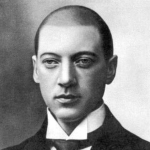Background
Elisaveta Ivanovna Dmitrieva was born on March 31, 1887, in Saint Petersburg City, Russian Federation. She was from a poor noble family. Her father was a calligraphy teacher, died early from consumption. Her mother was a midwife.

Sorbonne in the Latin Quarter in Paris, France. Historical house of the former University of Paris, and main university building of its successor Paris-Sorbonne University 1971-2017.
Elisaveta Ivanovna Dmitrieva was born on March 31, 1887, in Saint Petersburg City, Russian Federation. She was from a poor noble family. Her father was a calligraphy teacher, died early from consumption. Her mother was a midwife.
Upon leaving the Vasileostrov Gymnasium (1904), Elisaveta Ivanovna entered the Saint Petersburg Women's Pedagogical Institute in 1906. She graduated in 1908 in two specialties: medieval history and French medieval literature. She was also a free listener at the Saint Petersburg University of Spanish Literature and Old French with Alexander N. Veselovsky.
Elisaveta Ivanovna studied in Paris, at the Sorbonne, but left. After the institute, she taught Russian history at a female gymnasium and translated from Spanish.
In August 1909, the famous Russian artistic periodical Apollon received a letter with verses on a perfumed paper with black mourning edges, signed only by a single Russian letter Ch. The verses were filled with half-revelations about its author—supposedly a beautiful maiden with dark secrets. The same day a woman with a beautiful voice phoned the journal's publisher Sergei Makovsky and arranged for the publication of the verses. Over the next few months, publications of the newfound poetic star were the major hit of the magazine, and many believed that they had found a major new talent in Russian poetry. The mystery of the newfound genius was short-lived. In November it was discovered that the verses were written by a disabled schoolteacher, Elisaveta Ivanovna, with the participation of a major Apollon contributor and editor, the poet Maximilian Voloshin.
In the early 1920s, she worked with poet and translator Samuil Marshak on theatrical plays for children. Later she also published prose and translations.
Starting from 1921, she was searched and interrogated by the State Political Directorate along with other members of the Anthroposophic Society. Finally, in 1927 she was exiled to Tashkent where she died in 1928 of liver cancer. Shortly before her death, she was visited in Tashkent by her friend a prominent Sinologist Julian Shchutsky, and wrote, influenced by him, 21 poems attributed to Li Xiang Zi, a fictional Chinese poet exiled for his "belief in the immortality of human spirit". The name of Li Xiang, invented by Shchutsky, means "a house under a pear tree", where Dmitrieva indeed lived in Tashkent.
Physical Characteristics: In childhood and adolescence, Elisaveta Ivanovna was seriously ill: "tuberculosis of both bones and lungs". From then until the end of his life she suffered from leg pain and lameness.
In 1911 Elisaveta Ivanovna married Vsevolod Nikolaievitch Wassilieff, an engineer and uncle of french admiral Alexandre Wassilieff and took his last name.


